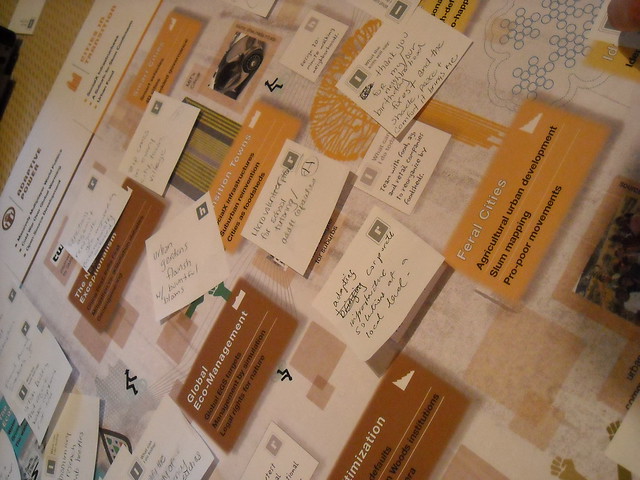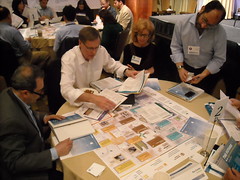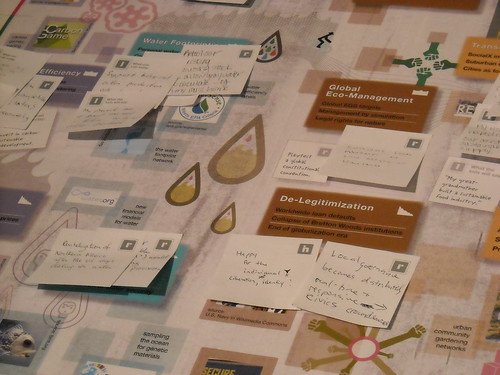 I recently came across the 2010 Map of the Decade, created by Silicon Valley's Institute for the Future (IFTF), and I have lately been having fun with forecasting and scenario mapping. IFTF is a non-profit think tank that forecasts/evaluates the new social and infrastructural transformations impacting global forces. The Map of the Decade project is part of the IFTF's Ten-Year Forecast Program, which hosts a yearly "game event" for collective prognostication among social tech folks, marketing futurists and the like. This year's map is an intriguing (game-board like) table for conversationally imagining the transformations in key areas of human activity that are likely to emerge over the next ten years.
I recently came across the 2010 Map of the Decade, created by Silicon Valley's Institute for the Future (IFTF), and I have lately been having fun with forecasting and scenario mapping. IFTF is a non-profit think tank that forecasts/evaluates the new social and infrastructural transformations impacting global forces. The Map of the Decade project is part of the IFTF's Ten-Year Forecast Program, which hosts a yearly "game event" for collective prognostication among social tech folks, marketing futurists and the like. This year's map is an intriguing (game-board like) table for conversationally imagining the transformations in key areas of human activity that are likely to emerge over the next ten years.I am blessed by my friends, but, well, they are not nearly as geeky as me. So it is highly unlikely that I may find willing volunteers who would join me to play the IFTF's forecasting "game", but ...I enjoy nonetheless thinking about the construction of this alternative reality table. The game's contrastive scenario mapping presents to me one of those engrossing random occasions where interesting topics from my MITSAP studies envisioning the city intersect with my interests in ancient rhetorical devices. The deep past and next decade collided here. ...But, I may have to get to that part later. For now, let me just explain this simple but intriguing "gameboard".
The table synoptically maps the structural transformations of five forces in four alternative world-scenarios. The columns of the table represent the five forces that will emerge - or undergo some extent of structural transformation - in the coming years, which the IFTF dubs: (1) the Carbon Economy; (2) the Water Ecology; (3) Adaptive (Political) Power; (4) Cities in Transition; and (5) (Social/Personal) Molecular Identity. (Parenthetical modifiers mine). The rows of the table represent the four contrastive world-scenarios in which these transformations could play out. The world scenarios represent four different trajectories of global economic, environmental and political circumstances that the world could progress into as we travel the next decade. They are:
- A Scenario of Growth, "Staying One Step ahead of Disaster" -- This is a world-scenario in which the current "growth paradigms" of the global economy continue to be the measure of personal and national success, but where infrastructural adjustments basically attempt to just plug the leaks in our Gaya bucket. In this world, political activity tends to shore up national self-interests. Investment is motivated by crisis management. Instead of encouraging a fundamental restructuring of a wide variety of human activities, knowledge resources remain uncoordinated, and current societal circumstances (e.g. increasing income disparities) continue in their present trajectories.
- A Scenario of Collapse, "Local Disaster, Regional Conflicts" -- This is a world-scenario in which local instabilities lead to widespread regional conflict and societal upheaval, sparking mass migrations. The de-legitimization of institutions "signals the end of the globalization era". In this world, political activity is opaque and distrustful. But, as cities go "feral", some local-system restructuring takes place at the small-grain scale as communities adapt to new circumstances (e.g. the coalescence of urban farming communities).
- A Scenario of Constraint, "Sustainable Paths in a Low-Capital World" -- This is a world-scenario in which the current wealth-production paradigms of the global economy can no longer be sustained. Instead, national and personal happiness is measured in non-monetary terms. In this peer-measuring LEED version of the world, lessening one's carbon/water footprint is the path to success. Infrastructural adjustments are policy based and draw on participatory self-monitoring strategies. In this world, political activity is policy-focused and concentrates on the scientific management of resources.
- A Scenario of Transformation, "Superstructured Systems" -- In this world-scenario, the barriers preventing wholesale restructuring of human activities are removed as new paradigms of organizational/social coordination arise (employing neural innovations for one). Conventional institutional paradigms of management are quickly outmoded (much as the cell phone has outmoded the need for erecting land-lines in developing countries, for example). Rapid innovation leads to biomimetic technologies and ecological infrastructures, enabling human colonization of the oceans and harsh environments. All aspects of human activity, including politics, are approached (or circumvented) through diffuse and cross-disciplinary activities. In this world, integration is the norm as new frames to approach systems draw to the surface and become widely engaged in a highly networked world. This is a world of wholesale "superstructuring" of basic human activities into novel forms. Think World 2.0.
 For a force transformation item isolated in each square of the world-scenario grid, players of the game are asked to imagine how "happiness" and systems of "resilience" are created within that transformation, and how interventions could leave a "legacy" our posterity would value . "Happiness", "resilience" and "legacy", however, must employ the evaluative paradigms of social value and self-identity extrapolated for that potential world, which is a kind of role-playing turn which puts the fun into this exercise of wonkery.
For a force transformation item isolated in each square of the world-scenario grid, players of the game are asked to imagine how "happiness" and systems of "resilience" are created within that transformation, and how interventions could leave a "legacy" our posterity would value . "Happiness", "resilience" and "legacy", however, must employ the evaluative paradigms of social value and self-identity extrapolated for that potential world, which is a kind of role-playing turn which puts the fun into this exercise of wonkery.The really fun part for me is that the game naturally leads you to ponder the spring points impacting important arenas of human activity, from the wholesale to the particular, in a wider matrix of possibilities that expand imaginative outcomes and lead to a better way to grasp the transforming subjects themselves.
More on that later.
 For now, let me just say that in the Southeast, this whole "Water Ecology" business is a force indeed to be reckoned with. Over the next ten years it will increasingly shape our local and regional policies, priorities and conflicts. Urbanists need to engage the water problem more and bring it front and center into the way we think of physical contexts. Atlanta, for one, has long been staring at a water crisis and has already adjusted mentally more than other cities to the large-scale implications of water ecology management challenges. We should not underestimate the potential for regional conflict over management of water ecology. Already, my city, Charlotte, is an embittered party in a cross-state debate over our water management issues.
For now, let me just say that in the Southeast, this whole "Water Ecology" business is a force indeed to be reckoned with. Over the next ten years it will increasingly shape our local and regional policies, priorities and conflicts. Urbanists need to engage the water problem more and bring it front and center into the way we think of physical contexts. Atlanta, for one, has long been staring at a water crisis and has already adjusted mentally more than other cities to the large-scale implications of water ecology management challenges. We should not underestimate the potential for regional conflict over management of water ecology. Already, my city, Charlotte, is an embittered party in a cross-state debate over our water management issues. I like the fact that the IFTF uses the term "Water Ecology" (rather than the easy go to "Water Economy"). So often when we think of water, we think in terms of water pipes and utilities and things with dollar signs preceding them. But if we think in terms of ecological systems, suddenly there's more ways to think of water. The water systems and interrelationships between kinds of water you may be overlooking. Buildings in our Southeastern climates, for one, generate enormous amounts of condensate from air conditioning equipment. Typically, this water is fed directly into the wastewater stream, instead of being put to good use. The design team for one of the projects that I'm doing some LEED consulting work for is thinking of ways to take advantage of absolutely enormous amounts of condensate. It is a cold storage facility. When the design team proposed the idea it blew my mind away when they presented their figures for how much water they could capture. There you go... a new water source to think about, for a facility of which, heretofore, I thought of only as a sink. An ecological cycle of water there all along invisible to me. Designers, plot those sources on your map.


No comments:
Post a Comment